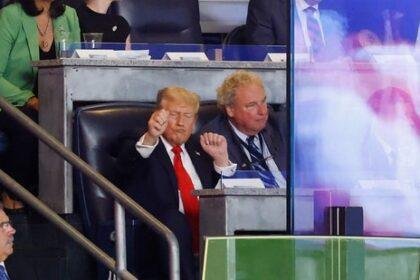China Responds to Trump’s Tariff Threats Amid Ongoing Global Tensions
In a significant diplomatic exchange, Chinese Foreign Minister Wang Yi has publicly rebuffed former President Donald Trump’s recent proposal to impose steep tariffs on China, citing the nation’s ties with Russia. During a press conference held in Ljubljana, Slovenia, on September 13, 2025, Wang emphasized China’s commitment to fostering peace and dialogue rather than engaging in conflict or economic sanctions.
Context of the Tariff Proposal
Trump’s call for tariffs ranging from 50% to 100% on Chinese goods is rooted in his assertion that such measures are necessary to counteract China’s support for Russia amid the ongoing conflict in Ukraine. In a post on his social media platform, Truth Social, Trump criticized NATO members for their inconsistent commitment to the war effort, particularly highlighting their continued purchase of Russian oil. He argued that this undermines their negotiating power with Russia and called for punitive measures against nations that maintain economic ties with Moscow.
Wang Yi’s Stance on Peace and Diplomacy
In response to these threats, Wang Yi articulated a vision of international relations that prioritizes dialogue over confrontation. He stated, “Wars cannot solve problems, and sanctions would only complicate them.” This sentiment reflects a broader Chinese diplomatic strategy that seeks to position China as a responsible global actor advocating for multilateralism and political solutions to conflicts.
Wang further asserted that China has a commendable record on peace and security issues, urging nations to strengthen multilateral mechanisms and adhere to the principles outlined in the United Nations Charter. His remarks underscore China’s desire to be seen as a stabilizing force in a world increasingly characterized by chaos and conflict.
The Historical Context of US-China Relations
The current tensions between the United States and China are not new; they are part of a long-standing rivalry that has evolved over decades. Since the normalization of relations in the 1970s, the two nations have experienced periods of cooperation and conflict. The trade war initiated by Trump in 2018 marked a significant downturn in relations, leading to tariffs and economic sanctions that have had lasting impacts on both economies.
Wang’s comments can be viewed as an attempt to pivot away from this adversarial narrative, advocating for a partnership between China and Europe instead. He stated, “China and Europe should be friends rather than rivals, and should cooperate rather than confront each other.” This call for collaboration is particularly relevant as Europe grapples with its own energy crisis and geopolitical challenges stemming from the war in Ukraine.
Implications for Global Trade and Diplomacy
The potential implementation of tariffs on Chinese goods could have far-reaching implications for global trade. The interconnectedness of the global economy means that such measures would not only affect China but also have ripple effects on supply chains and markets worldwide. Many industries, from technology to agriculture, rely on Chinese manufacturing and exports, making the stakes high for both nations.
Moreover, Wang Yi’s emphasis on multilateralism resonates with a growing sentiment among many countries that unilateral actions, such as tariffs, can lead to economic instability and increased tensions. The call for dialogue and cooperation may find support among nations that are wary of escalating conflicts and prefer diplomatic solutions.
The Role of Europe in US-China Relations
Wang’s remarks also highlight the critical role Europe plays in the broader context of US-China relations. As the European Union navigates its own energy dependencies and security concerns, it faces the challenge of balancing its relationships with both the US and China. The EU has historically sought to maintain a neutral stance, advocating for dialogue and cooperation over confrontation.
The relationship between China and Europe has been complex, marked by both economic partnerships and political disagreements. Wang’s assertion that “making the right choices amid the greatest changes in a century demonstrates the responsibilities that both sides should fulfill towards history and the people” suggests a call for a more unified approach to global challenges.
Conclusion
As the world grapples with the implications of geopolitical tensions, the exchange between Wang Yi and Trump serves as a reminder of the delicate balance in international relations. While Trump’s tariff threats reflect a hardline approach to foreign policy, Wang’s emphasis on peace and dialogue underscores a contrasting vision for the future. The outcome of this diplomatic standoff will likely shape not only US-China relations but also the broader landscape of global trade and cooperation in the years to come.











